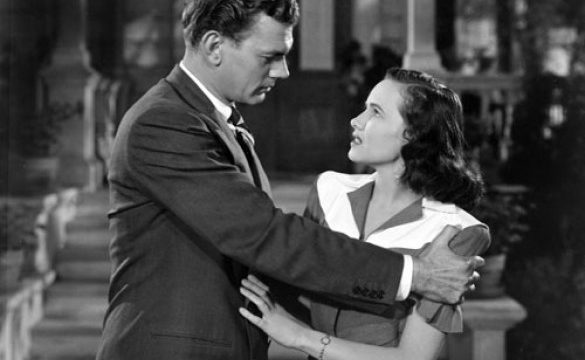The aforementioned Teresa Wright shall not be required to pose for photographs in a bathing suit unless she is in the water. Neither may she be photographed running on the beach with her hair flying in the wind. Nor may she pose in any of the following situations: In shorts, playing with a cocker spaniel; digging in a garden; whipping up a meal; attired in firecrackers and holding skyrockets for the Fourth of July; looking insinuatingly at a turkey for Thanksgiving; wearing a bunny cap with long ears for Easter; twinkling on prop snow in a skiing outfit while a fan blows her scarf; assuming an athletic stance while pretending to hit something with a bow and arrow. —Teresa Wright’s contract
That’s no uncertain terms, there. She didn’t want to be a starlet; she wanted to be an actress. She was nominated for three Oscars for her first three movies, a record—one Best Actress and two Best Supporting, winning one for Mrs. Miniver. Her contract also included a clause that she be allowed to return to the stage regularly. And then after the contract expired, she refused another one and never worked under contract in Hollywood again. She was also one of the first figures of film to regularly appear on television, in the Golden Age—not for her a sitcom named after her but instead frequent appearances on the television playhouses of the day.
Wright was born in Harlem in the tail end of World War I, as the area was slowly becoming a focal point of the Great Migration. Her parents separated when she was very young, and she grew up in New Jersey. In high school, she began acting, and after graduation she started a career on the New York stage, almost immediately being hired as the understudy for the role of Emily in Our Town and taking over the role completely when lead actress Martha Scott went to Hollywood to portray the role in the movie.
Wright played no few daughters and granddaughters—and, quite famously, a niece; there was something about Wright that projected wholesome innocence. In Shadow of a Doubt, she’s lived a sweet, pure life, quietly adoring her Uncle Charlie. Oh, her father and his best friend are true crime buffs before that was really codified as a concept for people of their class, but it’s all at a remove. Which makes it all the more chilling when real crime comes to visit and young Charlie has to figure out what to do about it.
Apparently, behind the scenes, she was well known for being professional and well-prepared, which must have made a nice change for people. Presumably this is because it’s harder to be unprepared and keep working on the stage. Alfred Hitchcock liked her, which is unusual from what I can tell. He wasn’t obsessed over her, and he didn’t treat her like a servant—he actually liked working with her. And he’s far from the only director who had good things to say about her, her performances, and her work ethic.
Wright isn’t discussed much these days. She didn’t want to be a star, and I suppose she never was—she wanted to be an actress, and she definitely was that. She was a talented woman who appeared in several stone-cold classic films, though, and she deserves to be discussed more than she is. She kept working, and she doesn’t seem to have ever lost her professionalism and courtesy. After appearing in Pride of the Yankees, she became an important part of Yankee lore and in fact was listed in the annual recitation of Yankees who’d died in the previous year when she died.
I don’t have a contract; I write these because I enjoy writing them. But I surely would like it if you’d support my Patreon or Ko-fi!

